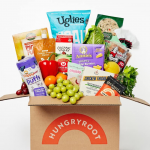With Kellogg’s 1894 Fund, A Switch from Corn Flakes to Capital
In the early 1900’s, when the Kellogg brothers — Will Keith (W.K.) and Dr. John Harvey — developed their eponymously named corn flake cereal, it was hailed as a unique new breakfast option. Now, over a hundred years later, the quest for innovation continues for Kellogg.
But rather than look in-house, like many other large food companies, Kellogg has decided to outsource its innovation through venture capital.
Named Eighteen94 (1894) Capital in a nod to when W.K. discovered flaked cereal, the group has roughly $100 million to invest in entrepreneurial brands. The sweet spot for companies will be those with revenues of $5-$10 million; 1894 says the check size will generally be between $1-$3 million. Independent VC firm Touchdown Ventures will assist 1894 by helping source deals, make connections and assist with the investment process.

In terms of what companies 1984 will invest in, Managing Director Simon Burton told NOSH that in general,“categories and adjacent categories [in] which Kellogg competes, are going to be areas where we’re going to look.”
“We’re leaving it fairly broad because we don’t want to limit ourselves,” he added. “It’s such a dynamic space, that if you become too constrictive you run the risk of missing something.”
Burton said the group’s investments may lean towards better-for-you and natural products. This is less due to a company directive and more because “It’s where a lot of the innovation is happening in North America,” Burton said, citing the parent company’s 2000 purchase of Kashi as one that the natural food world might find appealing
The fund considers acquisition a potential outcome of its investments, Burton said, but he added that it would not be requiring that Kellogg have the right of first refusal in deals.
It’s the company’s skills across all platforms that Burton believes will differentiate Kellogg from other fundraising options. While the team under 1894 includes Kellogg veterans who can assist portfolio companies with everything from supply chains to sales, two unique additions include “sustainability” and “e-commerce” experts — the latter role held by Chris Tutor, who most recently helped Bear Naked granola partner with IBM supercomputer Watson.
“There’s a fair amount of companies out there that can make an investment, my belief is that Kellogg can bring a fair amount of expertise,” Burton noted. “We’ll be an investor, they’ll be running the companies, but we’re there to help if they need us.”
While some may argue that Kellogg is simply following a game plan that’s been set by other big CPG brands, such as Campbell’s and General Mills, to make up for lack of innovation within the companies, Burton disagrees. “We have great R&D capabilities in house…but this is tapping a different vein of the innovation ecosystem,” he noted. “We’re not doing it because anyone else did it, we’re doing it because we recognize the pace of innovation out there. And once you recognize that, you take action to try to address it.”
















